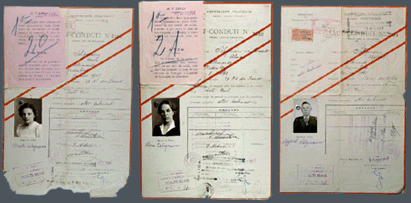 |
|
|
 |
|
|
|
|
|
|
|
|
|
Identification
card for entry to Cuba, issued by the Cuban Department of Immigration
to Alma Seligmann.
|
|
|
|
|
|
|
|
|
Siegfried,
Alma, and daughters Else and Ursula Seligmann lived in Ronnenberg, Germany,
where Siegfried was a respected cattle dealer. Realizing the danger that the
Nazis posed, the Seligmanns applied to emigrate to the United States and were
placed on the quota lists at the American consulate in Hamburg. During Kristallnacht
(November 9-10, 1938), Nazi storm troopers arrested Siegfried and transported
him to the Buchenwald concentration camp. Following his release, Siegfried,
Alma, and Ursula purchased tickets for the St. Louis. |
|
 |
|
|
|
When
the ship returned to Europe in June 1939, the Seligmanns were assigned to Belgium;
they settled in Brussels. Following the German invasion of western Europe in
May 1940, the Belgian police arrested Siegfried as an "enemy alien." He was
transported to France and detained in Les Milles, a ceramic tile factory converted
to an internment camp for German and Austrian nationals. In an effort to find
him, Alma and Ursula fled to France, were arrested in Paris, and transported
to the Gurs internment camp. |
|
|
Certificate
from the Central Commissioner in Aix-en-Provence, France, that Siegfried Seligmann
had been held in the camp of Les Milles, and while there had behaved well.
Such documents were among the numerous papers that refugees needed to assemble
in order to procure an exit visa from France.
|
|
|
|
|
|
|
During
the summer and fall of 1941, the family obtained the necessary visas to leave
France, cross Spain, and depart Lisbon for the United States. They arrived in
America just days before the Japanese attack on Pearl Harbor. Settling in Washington,
they rejoined Else, who had succeeded in leaving Germany on her own. |
|
|
|
|
|
|

"Safe
conduct" passes for Ursula (left), Alma and Siegfred Seligmann (right).
To
emigrate from France to the United States, refugees had to procure entry
permits from the American Consul in Marseilles, a French exit visa, as well
as transit visas for both Portugal and Spain. The Seligmanns were among
the lucky ones to receive all the approvals and stamps to reach and sail
from Lisbon.
|
|
|
|
|
|
|
|
|
Belgian
alien registration card identifying Ursula Seligmann as a German national.
When the German army invaded the Low Countries, these registration forms assisted
Belgian authorities to round up thousands of German nationals-fascist sympathizers,
anti-Nazi politicians, and Jewish refugees-including Siegfried Seligmann,
Ursula's father.
|
|
|
|
|
 |
|
|
|
|
 |
 |
 |
 |
 |
 |
 |
 |
 |
 |
 |
 |